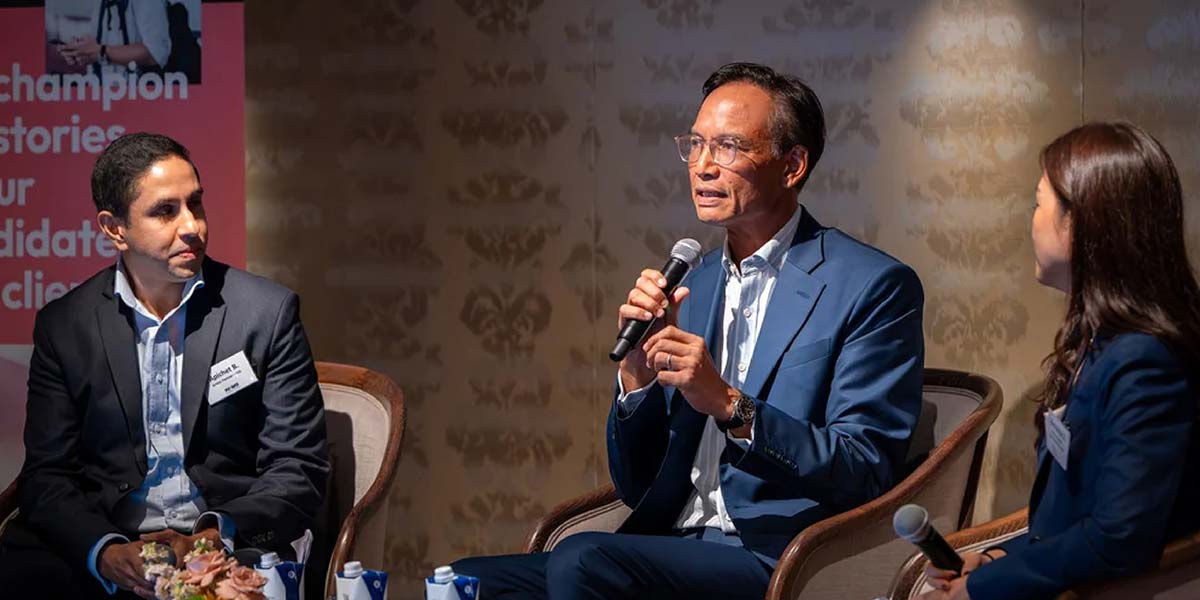Robert Walters is the world’s most trusted talent solutions business. Globally, we provide recruitment, outsourcing, and talent advisory services to businesses of all sizes, helping organisations find the talent they need to achieve their goals while empowering professionals to realise their unique potential.
On 17 September 2025, Robert Walters Thailand hosted an exclusive CEO Talk dinner under the theme “Unlocking Thailand’s Potential – Navigating Challenges and Seizing Opportunities.” The event brought together CEOs and senior executives from 40 listed companies and leading Thai conglomerates. We were deeply honoured to have Khun Korn Chatikavanij, Former Finance Minister of Thailand, join us for the evening.
As part of this year’s Robert Walters Annual Client Event, the dinner served as a collaborative platform for business leaders to discuss Thailand’s economic future. The purpose was to foster meaningful dialogue, drive sustainable progress, and generate actionable ideas through shared connections and collaboration.
This year’s event was hosted by Robert Walters in partnership with Kuvera Capital and Ultimate Destiny. Kuvera Capital is a private equity and alternative investment firm focused on creating long-term value through turnaround opportunities, logistics, and special situation investments. The firm emphasises risk-adjusted returns, disciplined portfolio management, and transparency, positioning itself as a value-driven partner for investors. Similarly, Ultimate Destiny is a premium consulting and corporate training company that blends Eastern wisdom with modern organisational development. Its mission is to help organisations and individuals transform inner energy into outward performance, aligning people, purpose, and productivity in a sustainable manner.
Khun Korn took centre stage during the evening with a candid appraisal of Thailand’s current state. He addressed key challenges such as political uncertainty and structural stagnation, which have dampened investor confidence over recent years—factors that led him personally to divest from Thai equities. Despite these hurdles, he highlighted encouraging developments, including increased political maturity, peaceful transfers of power, and growing societal recognition that street protests alone cannot deliver change. These shifts present an opportunity for bold reforms that could reposition Thailand within the regional economy.
Khun Korn emphasised the need for structural reforms to drive sustainable growth. In the energy sector, he advocated liberalising the power industry by separating transmission from generation, enabling independent producers to sell directly to consumers—reducing costs, boosting renewable energy investment, and improving transparency.
In agriculture, Khun Korn suggested consolidating smallholder farmers into larger corporate entities to enhance bargaining power, access capital, and foster innovation, citing New Zealand’s dairy cooperative model as an example. Additionally, in healthcare and med-tech, he highlighted Thailand’s advantage in serving millions of domestic and international patients annually. He proposed forging partnerships between hospitals and technology firms to position Thailand as a hub for medical device innovation and manufacturing.
He also urged Thailand to adapt to global shifts as structural advantages like young demographics and cheap energy erode. Facing challenges such as deflation and an ageing population, he stressed the importance of prioritising long-term strategies over short-term fixes.
In finance, he highlighted high transaction costs that hinder SME lending and proposed digitalising government and financial processes to improve efficiency and reduce corruption.
Moreover, in creative industries, Khun Korn underscored Thailand’s cultural capital—food, music, crafts, sports—and its potential for global success through bottom-up innovation supported by policies protecting intellectual property. He cited Korea’s K-pop as an example of private-sector-driven growth.
As he delivered his closing message, Khun Korn emphasised the critical role of forward-thinking and visionary leadership in shaping Thailand’s future. He urged businesses, policymakers, and individuals to actively champion initiatives that tackle deep-rooted structural challenges for long-term progress. Finally, he expressed confidence in Thailand’s ability to adapt and evolve its governance to meet the needs of its people and economy.
Khun Punyanuch Sirisawatwatana, Country Manager of Robert Walters Thailand, emphasised that Robert Walters is not just a trusted talent solutions firm but also a committed partner in developing Thailand’s talent ecosystem. “Our goal is to connect thought leaders, foster collaboration, and catalyse initiatives that contribute to a stronger future for Thailand—all while staying true to our purpose of powering people and organisations to fulfil their unique potential,” she said.
Robert Walters would also like to express its heartfelt gratitude to Kuvera Capital and Ultimate Destiny for their invaluable contributions in making the event a resounding success. As we look ahead, we encourage the business community to continue fostering dialogue, exploring opportunities for collaboration, and working together towards sustainable growth.





